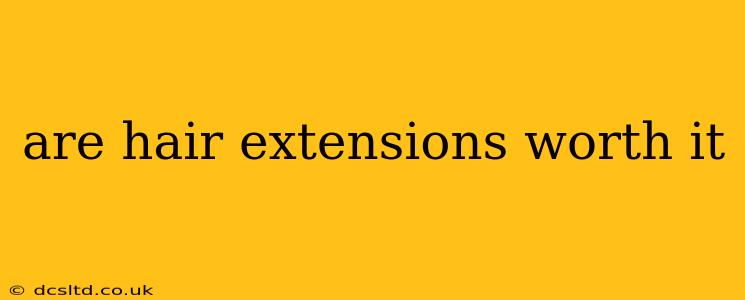The question of whether hair extensions are worth it is a deeply personal one, depending heavily on individual priorities, lifestyle, and budget. This comprehensive guide will delve into the pros and cons, addressing common concerns and helping you decide if this beauty investment aligns with your needs.
What are the Benefits of Hair Extensions?
Hair extensions offer a transformative power, capable of instantly enhancing your look and boosting your confidence. Let's explore the key advantages:
-
Increased Length and Volume: This is the most obvious benefit. Extensions allow you to achieve the long, luscious locks you've always dreamed of, or add significant volume to existing hair. This is particularly appealing to those with fine or thinning hair.
-
Versatility in Style: Extensions open up a world of styling possibilities. You can experiment with different hairstyles, braids, updos, and more, without the time and effort required to grow your own hair.
-
Instant Confidence Boost: Many women report a significant improvement in self-esteem after getting hair extensions. The feeling of having fuller, longer hair can be incredibly empowering.
-
Temporary Solution: Unlike permanent hair solutions, extensions offer a temporary fix, allowing you to change your look as desired. You can remove them when you're ready for a change or a break from the maintenance.
What are the Drawbacks of Hair Extensions?
While the benefits are alluring, it's crucial to be aware of the potential downsides:
-
Cost: Hair extensions, especially high-quality ones, can be expensive. The initial cost of the extensions themselves, plus the cost of installation and maintenance, can add up significantly.
-
Maintenance: Depending on the type of extension, maintaining them requires time and effort. Regular upkeep, such as washing, brushing, and styling, is essential to prevent damage and ensure they look their best.
-
Potential Damage to Natural Hair: If not properly installed or cared for, hair extensions can cause damage to your natural hair. Pulling, breakage, and scalp irritation are potential risks.
-
Commitment: Hair extensions require a time commitment for installation, maintenance, and eventual removal. This might not be suitable for everyone's busy lifestyles.
What Types of Hair Extensions are Available?
Several types of hair extensions cater to various needs and budgets:
-
Clip-in Extensions: These are the most affordable and easiest to apply and remove. They're ideal for occasional use or experimenting with different lengths and styles.
-
Tape-in Extensions: These are semi-permanent extensions applied using adhesive tape. They offer a more natural look and are generally easier to maintain than sew-in extensions.
-
Sew-in Extensions (Weave): These are sewn directly onto cornrows or braids and are a more long-term solution. They often require professional installation and removal.
-
Fusion Extensions (Keratin Bonds): Individual strands of hair are bonded to your natural hair using keratin. They offer a natural look and are long-lasting but require professional installation and removal.
-
Micro-rings/Beads: These extensions use small metal rings or beads to attach the hair to your natural strands. They're relatively easy to remove and cause less stress on the natural hair.
How Much Do Hair Extensions Cost?
The cost of hair extensions varies significantly depending on the type, length, quality, and amount of hair needed. Expect to pay anywhere from a few hundred dollars for clip-ins to several thousand dollars for high-quality, professionally installed extensions. It's always advisable to get a consultation from a reputable salon before committing to any type of hair extension.
How Long Do Hair Extensions Last?
The lifespan of hair extensions depends largely on the type of extension and how well they are cared for. Clip-ins can last for years with proper care. Tape-in extensions typically last 6-8 weeks, while sew-ins and fusion extensions can last several months with professional maintenance.
Are Hair Extensions Bad for Your Hair?
Hair extensions are not inherently bad for your hair. However, improper installation, inadequate care, or low-quality extensions can lead to damage, including breakage, hair loss, and scalp irritation. Choosing a reputable stylist and following proper care instructions are essential to minimize the risk of damage.
How Can I Minimize Damage When Wearing Hair Extensions?
To protect your natural hair, prioritize these steps:
- Choose a Reputable Stylist: Seek a professional with experience in installing and maintaining the type of extension you choose.
- Use High-Quality Extensions: Invest in ethically sourced, human hair extensions for better longevity and a more natural look.
- Follow Aftercare Instructions: Adhere to your stylist's recommendations for washing, brushing, and styling your extensions.
- Take Breaks: Allow your natural hair to rest between applications of extensions.
In conclusion, the decision of whether hair extensions are "worth it" is a personal one. Weigh the pros and cons carefully, consider your budget and lifestyle, and choose the type of extension that best suits your needs and hair type. With proper research and professional installation, hair extensions can be a beautiful and empowering addition to your look.
